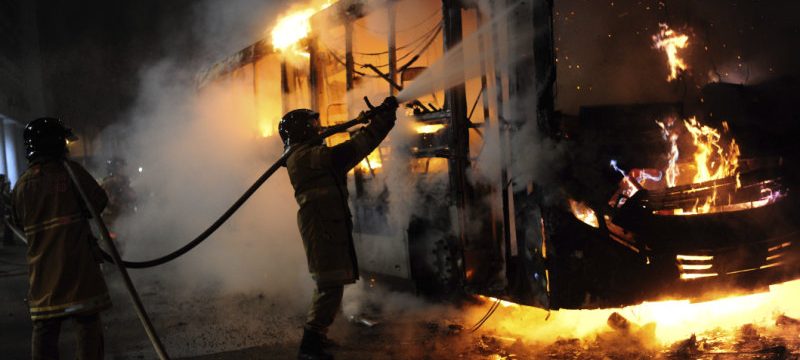Brasilia: Tens of thousands of protesters have gathered in 200 cities across Brazil to rally against education spending cuts in the biggest demonstrations yet against far-right President Jair Bolsonaro, who called marchers "useful idiots and imbeciles."
Brazil's National Student Union called for protests after the Education Ministry said it was freezing nearly a quarter of discretionary spending due to the government's precarious fiscal situation.
Demonstrators, many displaying the red colour of the opposition Labour Party, gather on Paulista Avenue in Sao Paulo to protest a massive cut in the education budget imposed by President Jair Bolsonaro.Credit:AP
Federal education officials this month announced budget cuts of $US1.8 billion ($2.6 billion) for public education, part of a wider government effort to slash spending.
The marches in more than 200 cities, according to a count by the Globo TV network, mark the first national protests against the administration of Bolsonaro, whose poll numbers are falling as he struggles with a weak economy, rising unemployment, an unruly coalition in Congress and infighting within his cabinet.
Speaking in Dallas, Texas, where he travelled to attend a gala dinner earlier shunned by New York venues, Bolsonaro denied his government had cut education budgets and cast the protests as a partisan spectacle.
"They are useful idiots, imbeciles, who are being used as the maneuvering mass of a clever little minority who make up the nucleus of many federal universities in Brazil," he said.
A peaceful rally of thousands in central Rio de Janeiro turned violent as the protest was ending, with unknown assailants setting a bus ablaze and shooting fireworks at police, who responded with tear gas to break up the crowd. There was no word on any injuries.
A firefighter extinguishes a burning bus, during a nation-wide education strike in Rio de Janeiro, Brazil.Credit:AP
In the capital Brasilia some 7000 students and university professors marched to Congress, carrying signs against the cuts. One said: "Education is not an expense, it is an investment." Another read: "Without investment there is no knowledge."
"Our message to Bolsonaro is that society will not accept these cuts of 30 per cent," said marcher Luis Antonio Pasquetti, head of the National University of Brasilia's teacher union.
There was no official nationwide crowd estimate available, but the protests were likely the largest such gatherings since the 2016 impeachment of former president Dilma Rousseff.
Thousands of demonstrators marched in Brazil’s major cities on Wednesday to protest the government’s cuts to education.Credit:Bloomberg
"The importance is to show that civil society is organised against these cuts," said Rodrigo Tonieto, 22, in Sao Paulo. "Together, we are going to say 'no' to the Bolsonaro government … To say 'no' to the mess that this government is."
Called to explain the cuts to lawmakers in Congress, Education Minister Abraham Weintraub blamed the situation on the legacy of the previous government, while defending a shift away from spending on universities to favour elementary schools.
"The priority is preschool, elementary school and technical school," he said. "A scientific, technical, number-based, efficient and managerial approach is vital to save this country from the economic stagnation of the last 20 years that we are living."
The nationwide protests were the largest since the election of far-right President Jair Bolsonaro.Credit:Bloomberg
Last week, university deans and education experts expressed concern about the future of academic research after the education ministry announced it had blocked all forthcoming scholarships for master's and doctoral students.
While Brazil's government claims it is implementing the budget cuts across the board and in an equal way, some say it could be politically motivated.
Bolsonaro has vowed to oust the "leftist ideology" from schools that he says is ruining Brazil's academic environment. Bolsonaro and Education Minister Abraham Weintraub have argued in favour of letting students film teachers during class time, in an effort to fight the alleged leftist indoctrination.
During the campaign, Bolsonaro said he wanted to "enter the Education Ministry with a flamethrower to remove Paulo Freire," one of Brazil's most famous educators, whose ideas on literacy teaching had worldwide influence.
Last month, an MP from the President's party introduced a bill to strip Freire, who died in 1997, of his ceremonial title as the "patron of Brazilian education."
Bolsonaro has praised military schools and he and top officials also spoke of plans to revise textbooks to excise references to feminism, homosexuality and violence against women.
Aside from the cultural war that some say is rocking the education ministry, critics say the government is not giving education the attention it desperately needs.
Brazil ranked 63rd out of the 72 countries and regions in the 2015 Program for International Student Assessment, conducted by the OCDE.
"It's a question of priorities. We need to give education the importance it deserves, for its participation in social progress and the construction of the country's future," said Claudia Costin, who was senior director for education at the World Bank in 2014-2016.
"Brazil intends to join the Organisation for Economic Co-operation and Development but is following a path that distances us from those countries, in terms of education, science and technology," Costin said.
Reuters, AP
Source: Read Full Article




